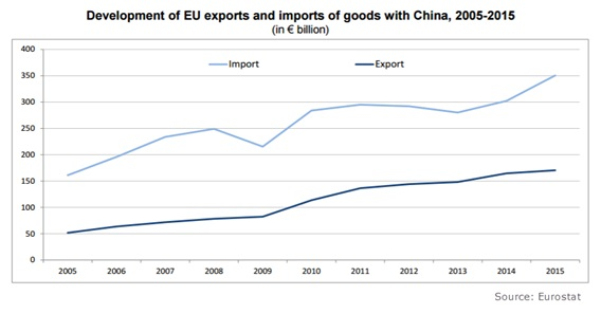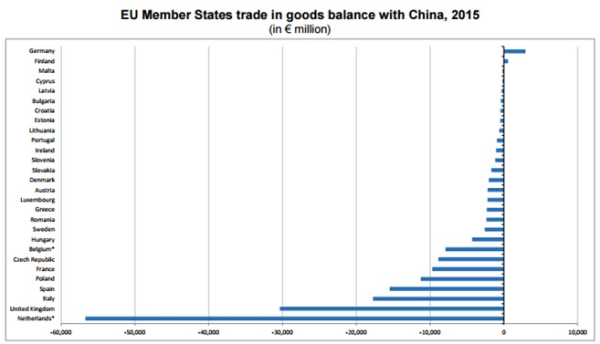An Overview of EU-China Partnership and Cooperation Agreement
By Harold Murphy
自2003年欧盟和中国建立中欧全面战略伙伴关系以来,两地区在政治和经济合作等重点领域达成了一系列协议,进一步加强合作。但是,由于双方尤其是欧盟经济增长放缓,这种伙伴关系正在逐渐发生变化。
今天的中欧关系是在1985年签署的"贸易与经济合作协定"(TECA)的法律框架下组建的。此后,欧盟与中国的关系在贸易和具体政策领域都大幅度扩大,中国和欧盟一致认为,TECA不再反映其关系的真实性质、范围与深度,并于2007年初开始就新的框架协议进行谈判。这些谈判的主要目标是商定一个全面的伙伴关系和合作协议(PCA),加强在经济、环境和社会等领域的合作。考虑到欧盟与中国之间现有的协议,新的PCA将对这些协议采取补充措施,涵盖一个框架协议下的所有重大问题。但是在目前情况下,欧盟希望升级的"经贸合作协定"(TECA)包括商业和政治层面。而中国希望将重点放在贸易关系上,不希望欧盟干涉中国"内政"等政治问题。 同时,中国不愿意与其他方面缔结具有法律约束力的双边协议。中国在PCA方面的主要焦点是贸易事务,中国正试图将贸易和经济问题分开。
Since EU and China have established their strategic partnership in 2003, both countries have furthered their cooperation by developing agreements in key areas like political and economic cooperation. Economic and especially trade cooperation has been the cornerstone in partnership between EU and China. However, this partnership is gradually changing since both sides are facing slower economic growth, especially the European Union. Another concern is the diverging view on fundamental principles that should become a part of a bilateral agreement.
The European Union has concluded several partnership and cooperation agreements (PCAs) so far, mostly with countries of Eastern Europe, the Southern Caucasus and Central Asia. Strengthening their democracies and developing their economies as well as to encourage trade and investment and provide a suitable framework for political dialogue is the main aim of these agreements. On the other side, China has already achieved agreements with several European countries, including EU member states. European countries having a partnership agreement with China are presented in the following table -

Over the past decades, deepening of EU-China relationship has resulted in various smaller, separate framework agreements for specific fields of interest. Through these agreements, relations of both parties have achieved a high level of institutionalization. Today's EU-China relations are structured under the legal framework called Trade and Economic Cooperation Agreement (TECA), signed in 1985. Since then, the EU-China relationship has expanded drastically, both in terms of mutual trade and specific policy areas, which made it necessary to start talks on a single comprehensive agreement that will upgrade the Trade and Economic Cooperation Agreement from 1985.
China and the EU agreed that the TECA no longer reflects the true nature, scope and depth of their relationship and started negotiations on a new framework agreement between the two parties in early 2007. The main objective of these negotiations is to agree on a comprehensive Partnership and Cooperation Agreement (PCA), which covers several fields of political and economic issues. Enhancing cooperation in environmental, labor and social fields, as well as financial and security matters will also be a crucial part of the prospective Partnership and Cooperation Agreement. Considering the existing agreements between EU and China, the new PCA would act complementing to these agreements, covering all major issues under one framework agreement.
However, recently negotiations between both sides have slowed down significantly. The EU favors mutual cooperation with other countries to be regulated through a single comprehensive agreement. In case of the PCA with China, the EU wants that the upgraded Trade and Economic Cooperation Agreement (TECA) must now include both commercial and political dimensions of their relations. On the other side, China wants to put the main focus on the trade aspect of the relationship and doesn't want the EU to interfere on political issues which China describes as "internal affairs".
The main economic priority of the European Union with China is to press the Chinese government to fulfill all obligations arising from the WTO membership as well as to protect its trade and investment in China. China's accession to the WTO in December 2001 required the country to take broad reforms and liberalize parts of its economy. While China has made notable progress in implementing its WTO commitments, the EU is still concerned with lack of transparency, inadequate protection of intellectual property rights, the dominant position of state-owned companies as a result of high degree of government intervention in the economy and other state measures which may discriminate foreign companies in China. Other priorities include the huge trade deficit, the renminbi's exchange rate, market access, investments and export of services. China is by far the biggest source of imports for the EU, with a daily turnover exceeding 1 billion Euros a day. The EU recorded a trade deficit of goods with China in the amount of $180 billion in 2015. This is in part due to remaining market access barriers in China.

On the other side, China does not prefer to conclude legally-binding bilateral agreements with other parties, which are comprehensive in its nature and regulate both trade and political dimensions. The main focus of China in the PCA is trade matters and China is trying to separate trade and economic issues from political issues. On trade and economic matters, China's concerns arise from EU's anti-dumping and anti-subsidy measures. China also wants to lift the arms embargo, which has met with strong resistance from the EU on grounds of concern for human rights.
 EU member states trade balance in goods, 2015, source: Financial Times, www.ft.com
EU member states trade balance in goods, 2015, source: Financial Times, www.ft.com
The chart above shows the trade balance with EU member states. Only Germany and Finland had a surplus in trading goods with China in 2015. EU's concern regarding this matter is therefore more than justified.
Both parties have different priorities regarding the Partnership and Cooperation Agreement.Â
While China wants to focus primarily on economic and trade matters and separate these from the political agreement, the EU treats the principles of democracy, human rights and rule of law as fundamental principles of its relationship with China. Both China and the EU are likely to have a tough time in trying to reach a comprehensive agreement which will satisfy both sides.
--- END ---